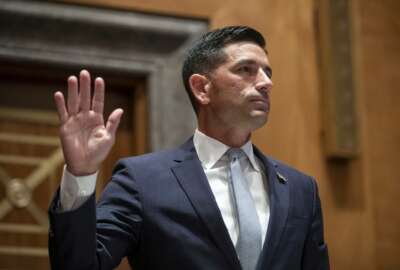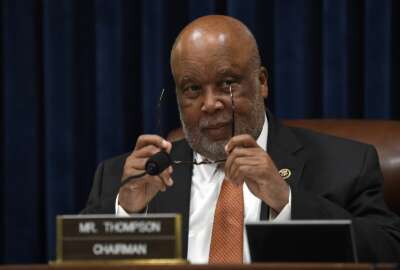

It's a complaint that started about the day after formation of DHS: Too many congressional committees have sway over the agency's plans, policies and budgets.
Best listening experience is on Chrome, Firefox or Safari. Subscribe to Federal Drive’s daily audio interviews on Apple Podcasts or PodcastOne.
It’s a complaint that started about the day after formation of the Homeland Security Department. Secretaries have complained, employees, contractors, academics, think tanks, even members of Congress themselves. The complaint: Too many congressional committees have sway over DHS plans, policies and budgets. Now one member of Congress has called for reform. He happens to be the chairman of the House Committee on Homeland Security. Mississippi Democrat Bennie Thompson joined Federal Drive with Tom Temin.
Interview transcript:
Tom Temin: Congressman Thompson, good to have you on.
Bennie Thompson: Thank you for having me.
Tom Temin: Let’s begin with the committee itself that you chair. In your recent testimony, you mentioned the black letter authorities that the committee has almost as if it started out hobbled in the ability to oversee DHS. Tell us about that.
Bennie Thompson: Well, you know, as you know, DHS was created after the events of 9/11. And as we went forward after that, we were a select committee, no real jurisdiction to promote legislation but, nonetheless we could hold hearings and issue reports and give testimony on various subject matter. But a couple of years later, Speaker Hastert and a Republican leadership created an opportunity for us to gain jurisdiction. But unlike other committees in Washington, like agriculture, armed services, what have you, our jurisdiction was spread across some 90 committees and subcommittees, which makes it very difficult. And so while there is a Department of Homeland Security and a House Committee on Homeland Security, we find various pieces of that jurisdiction, in transportation, in Energy and Commerce, in judiciary, in agriculture. So it’s a hodgepodge of jurisdictional challenges and for a department are really a function, you really need that specific jurisdiction. And that’s part of what my discussion going forward will be with the House leadership and hopefully, President [Joe] Biden when he’s elected president.
Tom Temin: And your committee, as you point out, has only six little narrowly drawn activities – to use your words – within DHS. What do you have sway over, the committee?
Bennie Thompson: Well, we have sway over TSA, which is the Transportation Security Administration, which actually was created with that. We now have jurisdiction over the cybersecurity domestic framework from a terror standpoint, we have some jurisdiction over border security, but not interior enforcement. And it’s the same agency. We have the ability to respond to natural disasters, but the trigger for allowing FEMA to respond is still over in Transportation and Infrastructure committee under the Stafford Act. So we share a good bit of that jurisdictional conflict. And so the Coast Guard, for instance, is in Homeland Security, but most of the authority is over in Government Reform and Oversight. So it’s a struggle. We work it. And as you know, one of the real issues in the 9/11 commission report yet to be addressed and completed is this jurisdictional issue. All the other issues that we outlined in that report we’ve accomplished, and the one outstanding item is jurisdiction.
Tom Temin: We’re speaking with Congressman Bennie Thompson, Chairman of the House Committee on Homeland Security. And what do you feel has been the effect on Homeland Security itself the department as a result of 90 different committees having something to say about its budget and its operations, and its policies?
Bennie Thompson: Well, it would be an understatement to say that leadership in those departments under the best of circumstances, have been stretched real thin. So everybody is trying to get a piece of DHS. But there’s only one DHS. So we have trouble scheduling committee hearings, because other people are trying to get the same people to come before their committee because they have that little piece of jurisdiction. In spite of it all, even with the conflicts,we’ve managed to keep the homeland safe from foreign and domestic terrorism. We’ve managed to reasonably respond to natural disasters. Now to say it could have been better is an understatement. But we have professional men and women in the ranks who believe in the mission, but from a strictly jurisdictional administrative leadership standpoint, it’s a mess. And so we are asking that you treat DHS like you do all other cabinet positions by limiting the responsibilities from a jurisdictional standpoint, specifically to the Homeland Security Committee.
Tom Temin: Well, as the chairman of that committee and a long-term member of Congress, a very senior member, how do you get that because for many members of Congress having a piece of jurisdiction is like a child with a rattle. And it’s pretty hard to pry it out of their hand.
Bennie Thompson: Well, the Holy Grail in Washington is something called jurisdiction. Very few chairpersons willingly give up jurisdiction. So our first step, as you acknowledge was to go before the rules committee and talk about the concerns we have for next year. So we’ve highlighted those concerns in our testimony before the Rules Committee. As a first step toward opening the discussion, we will talk to the Speaker [Nancy] Pelosi, [Majority] Leader [Steny] Hoyer, [Majority Whip Jim] Clyburn and other people in leadership. And we will compare the various other agencies and committees of jurisdiction and say, “See what we’re talking about? This committee is responsible for agriculture, this committee is responsible for the military, and our defense, this committee is responsible for labor, this committee is responsible for education – treat us in that same manner.” So that begins the process. And somewhere between where we are now, and this discussion with leadership, I hope to come to some acceptable position where we just have these 90-plus committees and subcommittees, there’s far too many for this department to be effective. Now, the other reason I say that is you have a morale problem to start with, and having to respond to all these agencies, committees and subcommittees, you end up with a tremendous amount of duplicative work, that really should not be. And so we are trying to minimize the spread and maximize the outcome. And you can only do that if you retain jurisdiction within a geographical or confined area like we are proposing.
Tom Temin: And would it be accurate to say that this is not really a partisan issue? Because I’m guessing that the Republicans on the committee agree with you on this?
Bennie Thompson: Well, that’s right. And I’ve had in the past Republican chairs who acknowledge that: Peter King from New York chaired the committee and voiced that; Mike McCaul from Texas also chaired the committee and voiced similar concerns. And so in this respect, we move forward in a bipartisan manner, because it’s the right thing to do. The goal of the committee, as I shared with you, is to keep Americans safe from domestic and foreign terrorists. But also make sure that in event of a hurricane, wildfire, flood, tornado or any other natural disaster, we are the backdrop when state and locals need help. And we have done a creditable job in that respect, but to say we can do a better job with a streamlined jurisdictional mandate – absolutely, we could.
Tom Temin: And do you think that some jurisdictional progress can be made in the next session? Because there – let’s presume for a moment, as you mentioned that there will be a change in administration, a change of party in the White House, there’s going to be a pretty big agenda writ large for Congress.
Bennie Thompson: Oh, no question about it. I look forward to the Biden-Harris administration, working hard to hopefully accomplish that. I’ve shared many of those concerns about jurisdiction and how we need to respond nimbly, to disasters and other things. And I’ve gotten nothing but positive feedback from key people who are trying to get this election over with and a successful one in that respect. But unlike where we are, with the current administration, the majority of people we’ve had, we’ve had five secretaries of Homeland Security in less than four years. That’s pretty much unheard of, and that kind of speaks to the volatility of the Trump administration and how they perceive getting things done. Well, it’s been very difficult when the majority of those secretaries have been acting, and in some instances for not very long, and the deputy individuals in the department as well as some of the assistant secretaries have also been acting. So we’ve had a significant number of vacancies to occur in the department. And all that has led to what I feel is the inability of the department to adequately do the best job they could under the circumstances.
Tom Temin: Mississippi Democrat Bennie Thompson is chairman of the House Committee on Homeland Security. Thanks so much for joining me.
Bennie Thompson: Well, thank you for having me. And if at any point you need to know anything else, please feel free to call me.
Tom Temin: We’ll post this interview along with a link to his testimony at FederalNewsNetwork.com/FederalDrive. Hear the Federal Drive on demand. Subscribe at Apple Podcasts or Podcastone.
Copyright © 2025 Federal News Network. All rights reserved. This website is not intended for users located within the European Economic Area.
Tom Temin is host of the Federal Drive and has been providing insight on federal technology and management issues for more than 30 years.
Follow @tteminWFED



